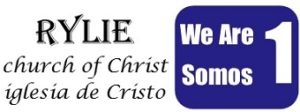Birthdays and Anniversaries
2-8 David Mendoza
2-10 Dan & Carolyn Anthony, Sam & Alice Pirozzo
Prayer requests:
Stacey Esner has a severely sprained ankle
Chaney Reames is undergoing extensive dental work.
Rachel Prater, Dena’s cousin, Rodney’s, recovering at home. Prayers please.
Chloe Birdwell, relative of the Weeks’s, great improvement, in a program in Houston. Keep praying, please!
Paul Tyler has a bad sort Parkinson’s. Got stem cell treatments. Pray for their success.
Shirley Weeks, Steve’s mom, continues to have trouble.
Teresa Weeks, Steve’s sister, having age related issues. She has Down’s Syndrome.
Sarah, Chris Girvin’s sister, on hospice care
Robert and Sue Waller, health issues
Darla Nitti, Wendi’s mom, good report
Leta, has a recurring cancer, prayer request from her granddaughter via our website.
Tammy Jones, Weeks’ neighbor, kidney failure/dialysis
Article:
Ephesians 4:1 reads: “I, therefore, the prisoner for the Lord, urge you to live worthily of the calling with which you have been called.” A Bible study group was asked, “What is this calling you have?”
The first person to answer repeated a persistent problem. Her reply ignored the biblical context. She offered the first idea that popped into her mind.
So what did she think Paul was urging her to fulfill? Her answer echoed what a host of others might say off the top of their heads. Such answers might include caring for the mentally ill, serving children, tending to the elderly and widows, helping the poor, taking care of my family, providing assistance to the disadvantaged – these speculative responses could go on.
It is true that both Christ and Paul would have us show love to all of these groups of people. However, when Paul wrote, “I urge you to live worthily of the calling with which you have been called” (Ephesians 4:1) did he have in mind individuals called to different niche areas of service? Not at all!
Unfortunately when she read “calling,” she assumed this referred to some mission just for her. To escape imposing our ideas upon the text, context must be king.
Previously in Ephesians Paul had outlined God’s audacious plan to unite all things in heaven and on earth in the Messiah. He had also explained how Christians are a part of God’s grand project and how as God’s workmanship they have been raised up with Christ to do good works. God has given his people a purpose to fulfill!
Thus after providing an overview of God’s plan and how God’s holy people fit into his plan (Ephesians 1-3), Paul wrote “Therefore” (Ephesians 4:1). In other words, it is in view of all that Paul had just taught about God, Christ and what God desires to do through his people that Paul focused his readers upon their proper response to God! God’s people need to fulfill their purpose, that is their calling, that God has given them.
This aligns how in other texts Paul identified the calling to who God had made his people to be, namely holy (1 Corinthians 1:2; Romans 1:7). In this particular text “calling” points to being God’s workmanship created in Christ Jesus in the likeness of God to do good works (Eph. 1:18; 2:10; 4:24). To live worthily of this calling involves fulfilling the general purpose/mission God has for all of his people. Calling does not refer to some individualized or niche task. The remainder of Ephesians unpacks the details of how to live worthy of this calling that God has for all of his people.
How does someone live upto this calling? Paul provided a brief summary. It involves living as those filled “with all humility and gentleness, with patience, putting up with one another in love, making every effort to keep the unity of the Spirit in the bond of peace” (Ephesians 4:2-3). God has created oneness in Christ. By our behavior and attitudes we are to maintain the unity God has created; not grieve the Spirit by working against him with the sinful tools of the devil.
The latter part of Ephesians, chapters 4-6, outlines various practical ideas regarding this lifestyle which God’s community should exemplify. In chapter 4 Paul began by explaining the foundation God has provided for oneness as well as Christ’s gifts promoting maturity and unity in Christ (Ephesians 4:4-16).
Then Paul pressed forward into affirming both general principles (Ephesians 4:17-5:21) as well as details for specific social roles (Ephesians 5:22-6:9) that are appropriate for those created in the likeness of God. God’s ways, not sin, should permeate Christ’s unified community. Thus maintaining the unity God has created will entail living in godly ways instead of giving the devil a foothold.
As Christians God has given us a new identity with clear marching orders. We are to be people who live up to being his handiwork who promote and maintain God’s work in Christ. To do this, we must live as people of light.
Barry Newton, link to original article
